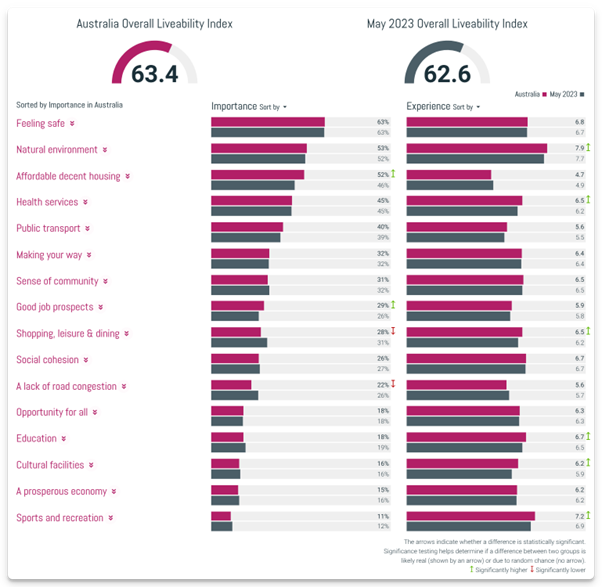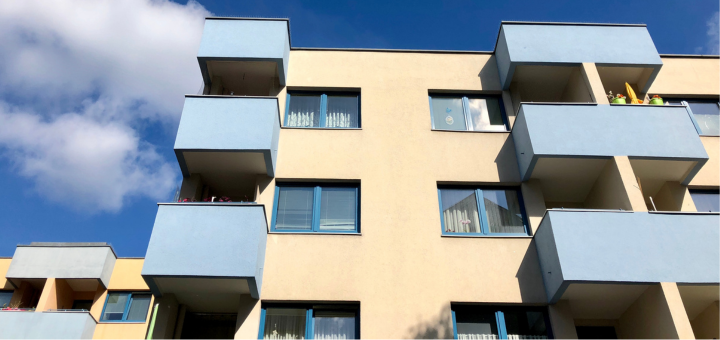In recent times, Australian leaders, including Prime Minister Anthony Albanese and Opposition Leader Peter Dutton, have stressed the importance of social cohesion in fostering a unified and resilient society. These discussions have gained urgency amidst rising concerns about divisive rhetoric and social tensions. The Jewish community, among others, has highlighted the need for stronger community bonds following anti-Semitic incidents, reinforcing that a cohesive society is essential for ensuring safety and prosperity for all.
Findings from .id's annual Living in Australia survey reinforce this, showing that Australians regard ‘feeling safe’ and ‘social cohesion’ as foundational to making somewhere a good place to live.
‘Feeling safe’ - both in actual security and perception - is the number one factor Australians value in their communities, fostering trust, participation, and wellbeing. Meanwhile, ‘social cohesion’ ranks as the 10th most important factor nationwide, contributing to a shared sense of belonging and mutual support. Encouragingly, the Living in Australia survey (collected in April 2024) found that Australians generally feel safe where they live (rating their local area an average of 6.8 out of 10, the third most positively experienced factor) and report reasonably high levels of social cohesion (6.7 out of 10, the fourth most positively experienced factor).
Given the strong contribution these factors make to how Australians viewed their quality of life in 2024, it is crucial to place greater emphasis on maintaining and improving them across the nation.

What is Social Cohesion?
Social cohesion refers to the bonds that connect individuals within a community, encompassing trust, shared identity, and the ability to work together for the common good. Research shows that communities with high social cohesion experience lower crime rates, better health outcomes, and higher levels of happiness. Conversely, a lack of cohesion can lead to division, alienation, and unrest.
How views on Social Cohesion vary across Australia
The Living in Australia survey reveals that social cohesion holds different levels of importance for Australians depending on where they live:
- Metropolitan Australians rank ‘social cohesion’ as the 7th most important factor in making somewhere a good place to live.
- Regional and rural Australians rank it 10th, often prioritising ‘a strong sense of community’ instead, reflecting that these communities experience cohesion more organically, reducing the need for an intentional focus on it.
- Inner and middle suburban residents value social cohesion more than those in outer suburban areas.
- People born in non-English-speaking countries living in metropolitan areas place even greater importance on social cohesion, ranking it 5th behind ‘feeling safe,’ ‘reliable and efficient public transport,’ ‘access to the natural environment,’ and ‘affordable decent housing.’
While we cannot be certain what drives these differences, some factors could include the challenges of living in more densely populated and diverse urban environments, which necessitate strong social cohesion to maintain harmony and cooperation. Additionally, metropolitan areas typically face more complex challenges, such as housing affordability (although we know this is an acute issue in Regional and Rural Australia), transport, and crime, which require collective problem-solving. Urban residents may also experience social isolation despite close physical proximity to others, making social cohesion even more critical for fostering a sense of belonging and mutual support.
The Link Between Social Cohesion and Community Safety
Social cohesion and community safety are strongly interconnected. Feeling safe is not just about low crime rates; it also includes perceptions of safety, which significantly impact quality of life and local economic prosperity. Research has consistently indicated that communities with strong social networks and active resident participation tend to experience lower crime rates. Cohesive communities often engage proactively in safety initiatives, such as neighbourhood watch programs and public space improvements, which contribute to a heightened sense of security. Additionally, socially connected residents provide essential support systems that help address issues like youth delinquency and social isolation, ultimately fostering greater resilience within the community.
As outlined in .id’s blog on the importance of feeling safe, well-lit streets, vibrant public spaces, and strong community networks foster social bonds and reduce fear. When residents feel safe, they are more likely to engage in community life, further reinforcing cohesion.
The Role of Local Governments in Strengthening Social Cohesion
As the level of government closest to the community, local councils play a pivotal role in fostering social cohesion by implementing initiatives that build trust, inclusivity, and a sense of belonging. Key strategies include:
- Community Programs and Events – Hosting multicultural festivals, volunteer opportunities, and community engagement activities.
- Urban Planning and Safety Improvements – Enhancing public spaces, street lighting, and community infrastructure.
- Youth and Family Support Services – Providing mentoring, family support initiatives, and local youth programs.
- Resident Engagement – Involving residents in decision-making through consultations and participatory planning.
- Safety Initiatives – Collaborating with law enforcement and community groups to improve real and perceived safety.
Conclusion
Social cohesion is fundamental to building resilient, safe, and thriving communities. While metropolitan areas may emphasise cohesion more due to their unique challenges, it remains essential across all contexts.
Visit our website to learn more about how .id’s Community Views service can help you understand and improve your community’s views on safety and cohesion where they live. Explore publicly available insights and data. Read case studies about the contribution our how Community Views service is making to government decision making.










